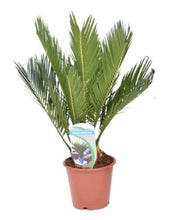Cycas revoluta, commonly known as the sago palm, is a fascinating and ancient plant often referred to as a "living fossil." Despite its common name, it is not a true palm but a cycad, belonging to a group of plants that have been around since prehistoric times. It features a stout, cylindrical trunk topped with a crown of stiff, dark green, feathery leaves. This slow-growing plant is a popular choice for gardens, patios, and as a houseplant, adding a touch of prehistoric charm to any space. It belongs to the Cycadaceae family.
Origin: Cycas revoluta is native to southern Japan, including the Ryukyu Islands.
Light: Cycas revoluta thrives in bright, direct sunlight to partial shade. It prefers at least 4-6 hours of direct sunlight per day, but in hotter climates, it can benefit from some afternoon shade.
Water: Allow the soil to dry out moderately between waterings. Water thoroughly when you do water, ensuring any excess drains away. Overwatering can lead to root rot.
Soil: Cycas revoluta prefers well-drained soil. A cactus or succulent mix is a good choice.
Fertilising: Feed your Cycas revoluta with a diluted balanced liquid fertiliser every 2-3 months during the growing season (spring and summer). Avoid fertilising during the autumn and winter.
Temperature: 15-35˚C; it is not frost-tolerant and should be protected from cold temperatures.
Humidity: Cycas revoluta tolerates a wide range of humidity levels and does not require any special humidity considerations.
Growth Habit: Cycas revoluta is a very slow-growing plant. It can eventually reach a considerable size, but it takes many years to do so.
Propagation: Cycas revoluta can be propagated from seed or by removing offsets (pups) that form at the base of the plant.
Toxicity: Cycas revoluta is highly toxic to humans and animals if ingested. All parts of the plant are toxic, but the seeds contain the highest concentration of toxins. Symptoms of poisoning can include vomiting, diarrhea, liver failure, and even death. Keep this plant away from children and pets



